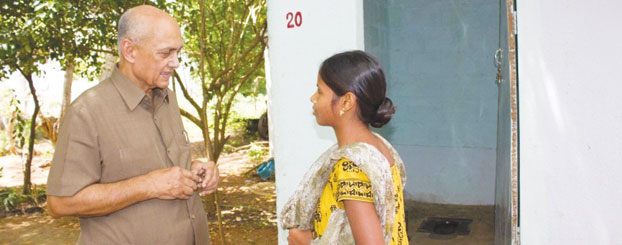I am glad to be here, one of the Districts that I have admired always,” said PRIP Kalyan Banerjee during his recent visit to RC Madras, RI District 3230. The purpose of his visit was to understand the path-breaking sanitation project implemented by the club at Amarampedu, a village near Chennai. It is one of the three villages adopted by the club to create an open defecation-free community, apart from building individual toilets.

The project involved the “triggering method” to sensitise people and change their mindset against open defecation. “Within two days of ‘triggering’ disgust and shame in the community, the behaviour of the people changed in a sustainable manner that resulted in 70 out of 100 households digging leech pit toilets on their own,” said club President S N Srikkanth. Today nobody in the entire village defecates in the open. Community-led toilets have been constructed without imposition from outsider setting an example for others to replicate.
Banerjee, who visited the village, commented, “(TRF Trustee) Sushil (Gupta) and I have been working on designing different types of toilets across the country to suit different people, different needs and habits; we were focusing on changing the mindset of children in schools because when they go home after being used to toilets in schools, they would insist on having the same at home. Here what you do is different — changing the mindset of people in the villages by telling them how disgusting it is not to have toilets. This is something I learnt today and I am going to carry it to rest of the country.”
Commending the club’s novel initiative — Polio Flame — that went around 30 Rotary Districts across 17 countries, commemorating India’s Polio-free status and heralding a Polio-free world, he said, “The concept of the Flame captivated the entire world, energising and motivating Rotarians wherever it was lit. I was filled with pride at the São Paulo Convention when everybody congratulated every Indian there for what you have done.” Srikkanth said that the Flame raised $2 million on its journey. He recognised RC Tirupattur President Arulalan for being the first to respond to his call to make the martyred polio workers at Pakistan, Paul Harris Fellows. Seventy three polio workers were killed in the 18-month period in Pakistan.
Referring to Rotary founder Paul Harris’ house in Chicago that is going to be torn down by the City of Chicago, Banerjee complimented Srikkanth for his brainwave — all Indian Rotarians can contribute to save the house from being reduced to rubble. “The house costs $400,000; while Rotary Club of Chicago is trying to save the house, they are unable to raise the necessary funds. I was amazed when you suggested that every Indian Rotarian will be ready to contribute $35 each to preserve the house where Rotary was born. I would now take it one step further and discuss this idea with (PRIPs) Sakuji Tanaka of Japan, D K Lee of Korea and maybe all Asians can get together and save the house. If that happens, it would be the third idea you would have initiated,” he said.
Banerjee participated in the club’s thanksgiving meeting along with RI Director P T Prabhakar and DG Nazar. The club was decorated with 40 awards this year plus the grand Platinum Trophy and the Presidential Citation. Rtn Krish Chitale traced the journey of the polio immunisation idea that the club pioneered in the mid-1970s; Prof Raghuram of IIM, Ahmedabad, briefed the audience on how the Amarampedu story was adopted as an interesting case study for his students. Prabhakar said, “Your club stole the show at the São Paulo Convention. While it is extremely rare even for a country to get a brief mention, the inaugural session was all about Chennai — the Polio Flame of your club and the Rotary My Flag My India which was declared the best Rotary Day project of the year.”





